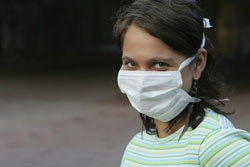Understanding SARS
Understanding SARS biology, pathogenesis and evolution is central to preventing or containing future outbreaks of virus infections. To this end, an overall effective strategy needs to be designed that will include appropriate diagnostic tools, antiviral regimens and a preventive vaccine. This was the focus of the EU-funded ‘Complementary research action to support SARS-related diagnostic, therapeutics and vaccine’ (SARS-DTV) project. Scientists studied the unique enzymatic complexes used by coronaviruses for replication in living cells and identified novel crystal structures of important SARS-CoV enzymes. Furthermore, an initial screening for antiviral lead compounds targeting SARS-CoV enzymes was performed. In a screening approach targeting the viral life-cycle, project members screened over 2,000 potential antiviral compounds and several were found to show antiviral activity. An important new research tool was developed based on reverse genetic systems for SARS-CoV and other coronaviruses. This system would facilitate the site-directed mutagenesis of coronavirus RNA and protein sequences, a technique used to investigate the importance of these elements in the viral life-cycle and in virus–host interactions. The SARS-DTV project also studied the humoral and cellular immune response in SARS infection and identified epitopes capable of eliciting specific T cell-mediated immune responses. Using an antibody-phage library approach, genes encoding neutralising human monoclonal antibodies were cloned and produced. Finally, prototype assays were developed for the detection of SARS-CoV antigens and specific nucleic acid sequences in patient specimens. The SARS-DTV consortium provided a multivariate analysis on SARS-CoV biology, immunology and pathogenesis. Collectively, the generated information painted a detailed picture on how the virus functions and what is required for an effective antiviral immune response. Implementation of project outcomes will hopefully warrant more effective SARS management in the future.

